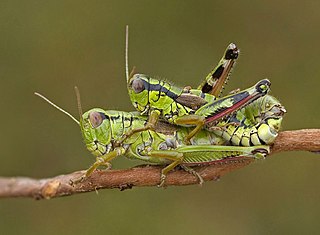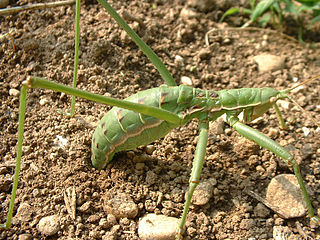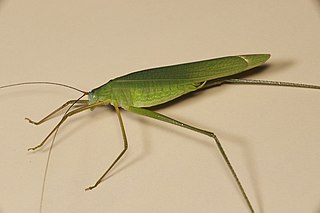
Cooloola is a genus of ensiferan orthopterans known as Cooloola monsters. It is the only genus in the subfamily Cooloolinae and family Cooloolidae of the superfamily Stenopelmatoidea.
Bienkotetrix is a genus of groundhoppers in the family Tetrigidae comprising, as of December 2018, only a single species, Bienkotetrix tibetanus. As its name suggests, it occurs in Tibet.
Trimerotropis occulens, the Lompoc grasshopper, is a species of grasshopper in the family Acrididae. It is endemic to the United States.

Macroxiphus is a small genus of bush crickets or katydids distributed in Southeast Asia and Micronesia. The nymphs of the insects mimic ants.
Peruvia is a genus of South American grasshoppers comprising two species:

Acridoidea is the largest superfamily of grasshoppers in the order Orthoptera with species found on every continent except Antarctica.

Hexacentrus is the type genus of bush-crickets in the subfamily Hexacentrinae. Most species of this genus occur in Southeast Asia and in Africa.

Saga is a genus of bush crickets or katydids containing around 15 species as of 2018. It is the only genus in the tribe Sagini and belongs to the subfamily Saginae. Species have been recorded from mainland Europe and western Asia.
The Tanaoceridae are an insect family in the monotypic superfamily Tanaoceroidea in the suborder Caelifera. They have been called desert long-horned grasshoppers.

Patanga is a genus of grasshoppers in the subfamily Cyrtacanthacridinae. Species are distributed throughout Asia: from India, China, Japan, Indo-China and western Malesia. The genus was named in 1923.
Microtettigonia is a genus of bush-crickets or katydids, endemic to Western Australia and known as micro katydids. It is the only genus of the subfamily Microtettigoniinae.
Hybusa is a genus of neotropical stick-mimicking grasshoppers, the only genus in the subfamily Hybusinae. They are herbivorous.

Erucius is a genus of grasshoppers in the family Chorotypidae. Species in this genus can be found in Vietnam and Malesia, including the Philippines. It is the only genus in the subfamily Eruciinae.
Oxyphlaeobella is a genus of grasshoppers in the family Acrididae, subfamily Acridinae. Species can be found in southern China and Indo-China.

Callimenellus is an Asian genus of bush crickets in the subfamily Pseudophyllinae. It is the sole genus in the tribe Callimenellini.
Tympanophyllum is a genus of Southeast Asian leaf-mimicking katydids, insects in the tribe Phyllomimini. Species in this genus have been recorded from India to New Guinea. The genus was named in 1902.

Elimaea is a large genus within Tettigoniidae, the bush cricket or katydid family. Species in this genus are found in India, southern China, Indo-China and Malesia.
Anabropsini is a tribe of king crickets. The tribe comprises over 40 species, has a broad distribution in Old and New World tropics, including Asia, Africa, Oceania, Central America, and South America.

Dictyophorus griseus is a species of African grasshopper in the family Pyrgomorphidae, the gaudy grasshoppers.

Orophus tessellatus, the false leaf katydid, is a species of katydid native to Mexico, Central America, and South America. It is in the large subfamily Phaneropterinae within the tribe Amblycoryphini. Its coloring varies from brown to green, some with spots, mottling, or uniform in coloration. The body length reaches 16 mm (0.63 in) in males and 22 mm (0.87 in) in females. The ovipositor is approximate 7 mm (0.28 in) in length. The species is characterized by the size of the forewings and their "dirty" coloring.











